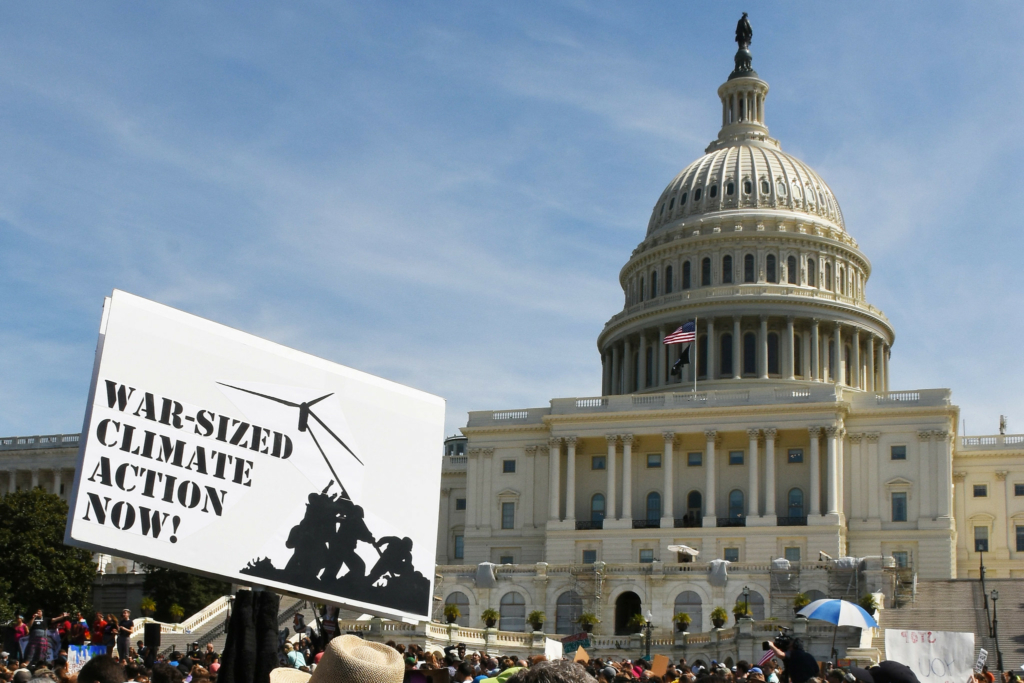
Photo: Amaury Laporte
It is August 2018. Fifteen year old Swedish girl, Greta Thunberg, skips school to protest for a reduction in carbon emissions. She had been recently inspired by American students refusing to attend school after the tragic February school shooting in Parkland, Florida. After Sweden was hit by massive heat waves and an intense summer due to climate change, she felt she couldn’t stay silent any longer. Now it was her turn to take action, as she sat alone outside the Swedish Parliament, demanding change on how the Earth is treated.
Only 15 months later, Thunberg’s strike for climate has become an international movement. She has lead and inspired millions of people worldwide, from young children to adults, protesting for immediate change. Passionate people flood the streets of both large cities and small towns, carrying signs with phrases such as, “There is no Planet B,” “How dare you?” and “Why should we study for a future we won’t even have?”
These climate strikes have most notably been held on two Fridays, September 20th and September 27th, 2019. This has been inspired by Thunberg eventually skipping school every Friday to protest. These climate strikes aren’t at all exclusive to the USA or Sweden. They have occured in Canada, New Zealand, Uganda, Columbia, Germany, Japan, Indonesia, and over 100 more countries across the globe.
September 20th is estimated to have consisted of the largest climate strikes in world history. It is estimated that over 4 million people participated worldwide, skipping school and work to have their voice heard. Most of these protesters were from Germany, which alone had 1.4 million participants. On September 27th, over 2 million people participated.
Most strikers are teenagers and those of generation Z. The goal of the strikes are to grab the attention of world leaders and older generation, demanding reduction in carbon emissions to save the planet from a mass extinction. Protesters want the Earth to have a safe future where future generations can thrive. They believe our political leaders should be doing more, and they should be reducing emissions at a much quicker rate than they currently are. According to many global scientists, emissions must be reduced to net zero by 2050, at the very latest.
There is a good reason protesters are so urgent. If global temperatures continue to rise rapidly, the planet will face many negative consequences. Sea levels will rise, impacting residents and wildlife along the coast. Coral reefs will die out. The Arctic could have no ice throughout the summers. Heat waves, flooding, and storms will rise in frequency and severity. Wildlife will lose habitats, putting many species at risk for being endangered.
Williamsville East sophomore, Waverly Wobschall, participated in these climate strikes on Friday, September 27th. Instead of coming to school dressed in red and gold, and finding out who our homecoming king and queen would be, she sat outside of City Hall to protest. She was inspired by Greta Thunberg, recreating an English translation of Thunberg’s sign from her earliest protests that read, “School strike for the climate.”
“It feels good to spread knowledge to people,” Wobschall describes, “I was a single party, but people occasionally sat beside me and asked me questions. I love educating others about a subject I’m so passionate about.”
She striked again on Sunday, September 29th at Niagara Square. She continues to spread her view on climate change and the planet on her Instagram. She states, “If you’re not part of the solution, you’re part of the problem.” She posts a picture of her sign that reads, “Don’t be a climate bystander.” Wobschall would love to educate more on the subject during her climate strikes, and help make a positive impact on the world.
Wobschall states that no one has ever talked her down for her protests. Everyone has been supportive of her during her journey to save the Earth. Unfortunately, not everyone is as fortunate as her. Many adults have given hate to protesters, especially leader Greta Thunberg. However, most are unphased by the hate. They block out those who call them brainwashed and other negative names, and continue to demand change. They plan to keep working until they see positive alterations in carbon emissions.
Generation Z is made up of bold and passionate young adults and teenagers who have been showing their elders just how determined they are to make a difference. They shout during their protests, “When adults act like children, children must act like adults.” They portray to every person in their path that you are never too young or too small to make a difference.
